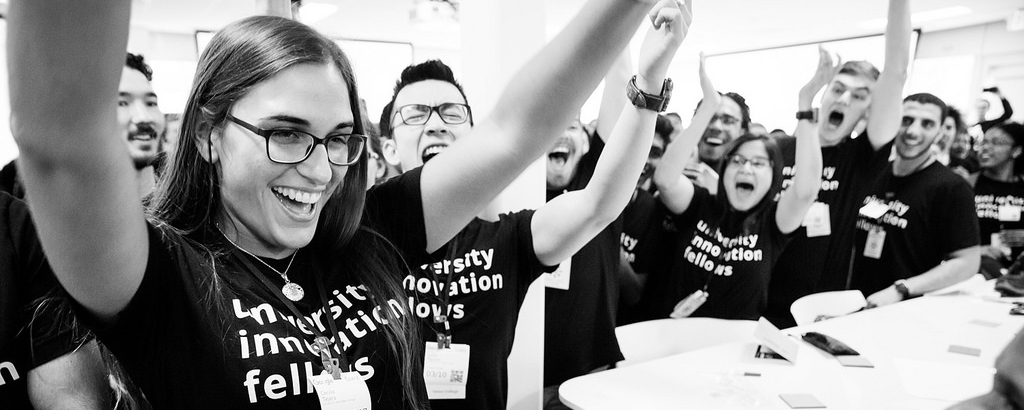229 students named University Innovation Fellows for Fall 2017

229 students from 62 higher education institutions in 10 countries have been named University Innovation Fellows.
The University Innovation Fellows program empowers students to become agents of change at their schools. Fellows work to ensure that their peers gain the knowledge, skills and attitudes required to compete in the economy of the future and make a positive impact on the world.
To accomplish this, Fellows advocate for lasting institutional change and create opportunities for students to engage with innovation, entrepreneurship, design thinking and creativity at their schools. Fellows design innovation spaces, start entrepreneurship organizations, host experiential learning events, and work with faculty to develop new courses.
The program is run by Stanford University’s Hasso Plattner Institute of Design (d.school). With the addition of the new Fellows, the program has trained more than 1,200 students since its creation.
Fellows are sponsored by faculty and administrators as individuals or teams of students, and selected through an application process twice annually. Following acceptance into the program, schools fund the students to go through six weeks of online training and travel to the University Innovation Fellows Silicon Valley Meetup. Throughout the year, they take part in events and conferences and have opportunities to learn from one another, Stanford mentors, and leaders in academia and industry.
“During training, Fellows gain skills, mindsets and knowledge to face ever-more complex challenges at their schools and in the world,” said Humera Fasihuddin, co-director of the University Innovation Fellows program. “They learn frameworks like design thinking and lean startup, which help them analyze their campus ecosystems, understand the needs of others, and uncover opportunities for change. As a result, Fellows design learning experiences that better prepare peers for their careers.”
“In traditional education systems, students have to wait until they graduate to make a difference. We don’t believe that,” said Leticia Britos Cavagnaro, co-director of the University Innovation Fellows program. “Students are uniquely equipped to make a difference while they’re in school; they know best what other students want and need. Our Fellows are working with their peers, faculty and administrators to co-design a different educational experience and bring about change where it’s needed most.”
The new Fellows join the program from the following schools:
- Aditya Engineering College
- Ambalika Institute of Management & Technology
- Annamacharya Institute of Technology & Sciences
- Boğaziçi University
- Bucknell University
- California State University, Fullerton
- City College of New York
- Clemson University
- Dalhousie University
- Dhanekula Institute of Engineering & Technology
- Folsom Lake College
- Gayatri Vidya Parishad College of Engineering
- George Fox University
- Georgia Institute of Technology
- Hartwick College
- James Madison University
- K L University
- Kent State University
- KKR & KSR Institute of Technology & Sciences
- KLS Gogte Institute of Technology
- Koç University
- Leuphana Universität Lüneburg
- Louisiana Tech University
- Madanapalle Institute of Technology & Science
- Michigan Technological University
- North Dakota State University
- Ohio University
- Prairie View A&M University
- QIS College of Engineering & Technology
- R.V.R. & J.C. College of Engineering
- Rensselaer Polytechnic Institute
- Sagi Rama Krishnam Raju Engineering College
- Shri Vishnu Engineering College For Women
- Siddharth Institute of Engineering & Technology
- Sierra College
- Smith College
- Sri Padmavati Mahila Visvavidyalayam
- Sri Venkateswara College of Engineering
- Srinivasa Ramanujan Institute of Technology
- Susquehanna University
- Swarthmore College
- Universidad Católica del Uruguay
- Universidad de los Andes
- Universidad del Desarrollo
- Universidad del Turabo
- University College of Engineering Kakinada
- University of Colorado Colorado Springs
- University of Delaware
- University of Minnesota
- University of New Hampshire
- University of Puerto Rico, Mayagüez
- University of St. Thomas
- University of Tulsa
- University of Twente
- Utah Valley University
- Vasireddy Venkatadri Institute of Technology
- Vignan’s Foundation For Science, Technology & Research
- Virginia Tech
- Western State Colorado University
- Worcester Polytechnic Institute
- York College of Pennsylvania
- Zhejiang University
This cohort of Fellows includes students from 20 schools in India, who are partially funded by Google to take part in the University Innovation Fellows program. Read more about the program’s work in India here.
In November 2017, students will have the opportunity to participate in the Silicon Valley Meetup, which brings together all Fellows trained in Fall 2017. During this gathering, Fellows will take part in immersive experiences at Stanford’s d.school and Google, and work with leaders in education and industry. They will participate in experiential workshops and exercises focused on topics including movement building, innovation spaces, design of learning experiences, and new models for change in higher education.
Applications for the Spring 2018 cohort of University Innovation Fellows are due on October 30, 2017. Learn more and apply here.
Media contact:
Laurie Moore
Communications Director
University Innovation Fellows Program
(650) 561-6113
laurie@universityinnovation.org

